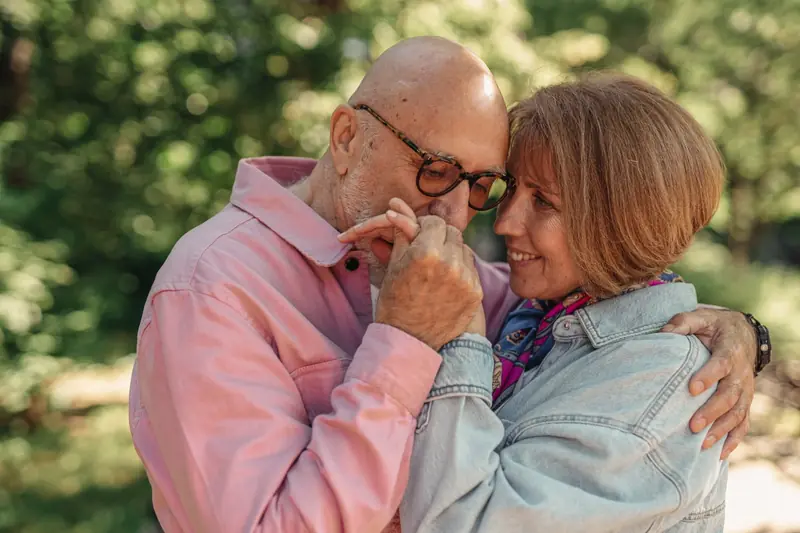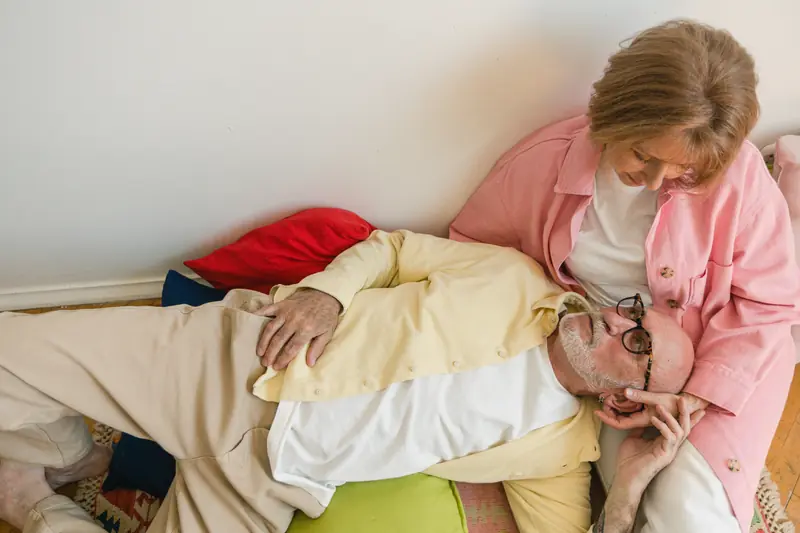
How to maintain relationships over the years, when to let go of a partner, and what to strive for: a rational approach and inspiring examples.
Synchronizing Heartbeats
Every person might dream of such a fate: an American couple lived together for 65 years, passing away just 88 minutes apart. “I love you, death won’t separate us,” said the devoted husband to his dying 87-year-old wife, and then he followed her into the afterlife. The story of Pennsylvania retiree James Landis made headlines not just in local newspapers: the old man left this world an hour and a half after his wife, succumbing to a heart attack. “Grandpa’s heart was broken by Grandma’s death; they were one,” said their granddaughter.
The close timing of a couple’s death after many years together is a phenomenon that often occurs. Older adults find it challenging to cope with the loss of a loved one. One hypothesis suggests that over the course of their lives together, a connection is established between the partners’ heart rhythms, and when this connection is severed by one partner’s death, it can lead to the other’s heart stopping as well.
Is Love Possible in Later Life?
Those fortunate enough to reach their “golden” wedding anniversary often say that growing old together is a great blessing. It’s rightly noted that love in later life isn’t found; it’s created. As people age, communication with a partner becomes as essential as sleep and food: it’s hard to live without it. In mature love, one fears not for themselves but for their beloved: if one falls ill, the other will provide support.
Researchers have even compiled a “body of evidence” regarding the benefits of touch: physical contact improves the health of older adults. According to a study by British scientists, handshakes and hugs significantly enhance the physical and emotional well-being of seniors, helping to alleviate the pain of loneliness. Just having someone nearby to give a pat on the shoulder can reduce the likelihood of depression. Loneliness in old age can be deadly: it complicates chronic illnesses and increases the need for additional medications.

Sex in Later Life – Is It Appropriate?
From a medical standpoint, the act of love between mature individuals is not inappropriate. Love and desire are just as necessary for the elderly as they are for the young: it has been proven that sex helps maintain mental health. Studies show that retirees who continue to have sexual relations at age 70 are less likely to suffer from memory problems and other age-related cognitive disorders. Regular sex improves blood flow to the brain and enriches the body with hormones responsible for intellect. Psychologists find that retirement offers an additional opportunity for closer contact with a partner and a “revitalization” of sexual relationships.
In the Netherlands, one elderly citizen even sued the government for seven years to defend his right to sex. Klaas Bruin won his case, receiving compensation from the state for… expenses related to hiring sex workers. The retiree supported his claims with medical documentation: his therapist testified that after sexual intimacy, his elderly patient required fewer medications, while a psychiatrist noted that interaction with a woman significantly improved the mental state of older men. Since Bruin had been a civil servant before retirement, local laws required the government to cover all health-related expenses.
Interesting results were obtained by researchers from the University of Rostock (Germany): 57% of participants aged 60-70 reported being satisfied with their personal sexual relationships, and 70% of those aged 75 felt the same. These figures can be seen as evidence that sexual activity does not depend on the number of years lived.

Love Knows No Age
Marriages based on mutual love between people of the same generation are often considered more harmonious. However, there are no standards in matters of the heart. We are accustomed to condemning “unequal marriages,” but such unions are not necessarily mismatches. Even in a marriage of convenience, psychologists argue, there can be positive meaning for both partners.
The significant age difference between writer Volodymyr Korolenko and his chosen partner did not prevent them from creating a wonderful family. The marriage of 60-year-old actor and director Charlie Chaplin to 18-year-old actress Oona O’Neill bore good fruit: they lived together for 34 years, had eight children, and left behind masterpieces of cinema.
There are plenty of such examples. Young women who have not found peers who meet their expectations often gravitate toward older men who are more spiritually developed: wise, experienced, and ready for stable relationships. However, in the last romantic impulse, one can find not only happiness. In later years, new feelings can become a test. While the loss of first love may not be fatal, mistakes in later love can be irreparable.
Late Love
Unfortunately, not everyone manages to enter the “third age” with a life partner. Some have been widowed, while others have been left for new families. Late love often carries a bitter aftertaste due to guilt toward the abandoned partner with whom many paths were shared. Most often, it is the man who leaves the family. If he abandons his “better half” for another woman, the stress for the abandoned partner is usually stronger than if the partner leaves for “nowhere.” Some hurt wives later avoid men and cannot recover from the emotional pain for the rest of their lives. Self-esteem plummets to zero, as most blame themselves for the family breakdown. Psychologists explain why this mindset should be avoided.
The most common reason for men’s infidelities “while their wives are still alive” is the desire to prolong youth in a new union (“gray hair in the beard – devil in the ribs”). Not all couples emerge from hormonal changes during andropause without losses. Some are willing to take back the wayward husband: the “frenzy” during a midlife crisis lasts from three to five years. However, repentance and forgiveness must be sincere, without returning to the past. Others put a definitive end to the past: you cannot step into the same river twice.
In any case, do not blame yourself for the breakup of a relationship. Even if the reason is that you couldn’t please your husband: you were a poor housekeeper, didn’t shine with beauty, failed to engage in conversation, or didn’t meet his needs in bed. Adapting to your partner means losing your identity. Even worse is trying to keep a partner by breaking yourself. Let go, draw conclusions, and strive for happiness in the future. By the way, a husband is responsible for a sick wife (and vice versa), but that’s not about love.

Don’t Separate from Your Loved Ones
Sometimes it happens that after 77 years of marriage, a 99-year-old Italian filed for divorce from his 96-year-old wife after discovering her correspondence with a lover from 60 years ago in an old dresser… In the letters, the lovers discussed their desire not to destroy their families. Despite the “statute of limitations” on the sin, the centenarian felt deceived and turned to the court. The long-ago betrayal of his wife became the reason for the dissolution of a marriage that had produced five children, 12 grandchildren, and one great-grandchild. The previous record belonged to 98-year-old British couple Bert and Jessica Wood, who divorced after 36 years of marriage.
One must be prepared for the fact that family relationships change with age. The “threshold state” occurs around 60-65 years. When both husband and wife were working, each lived their own life, and the couple spent only evenings and weekends together. Upon retirement, tensions may arise between spouses. Reducing this tension can be achieved by dividing interests into shared and personal ones. Each partner should have the freedom to choose their activities. Without personal values, spouses will inevitably grow tired of each other. A husband may be irritated by the fact that he is no longer engaged in his usual work and socializing with his former circle. Meanwhile, a wife may face the unpleasant realization that household responsibilities have increased, while her husband’s constant presence at home limits her freedom. If the couple finds activities they both enjoy, their relationship will become warmer. Shared interests and joint endeavors, such as working in the garden, running a family business, or mutual hobbies, can bring them closer together.

Love for Life in Later Years
Most wives report that their health begins to improve a few years after retirement. For men, it’s the opposite: after leaving work, they tend to “fall apart.” A man’s well-being improves when he joins his retired wife, who has also stepped away from work. If a married man retires first, there’s no one to care for him because his wife continues to work. Without such care, men soon feel worse. Sociologists scientifically advise married men to retire only after their wives have done so.
“It is in a woman’s nature to care more about the health of loved ones than about her own well-being, which is why retired women become true guardians of their husbands’ health,” notes Professor Angela Curl from the University of Missouri (USA).
Love for life in later years is sustained by feelings for loved ones: spouses and children. The combination of marital and parental love is the main complexity of mature feelings. Psychologists advise against giving oneself “into slavery” to children, dissolving in the cares of a daughter, son, or grandchildren at the expense of attention to a husband or wife. Relationships with children should not interfere with the personal happiness of parents. It’s never too late to care for your own life and its meaning—love, as it is the most reliable “safeguard” against aging.
